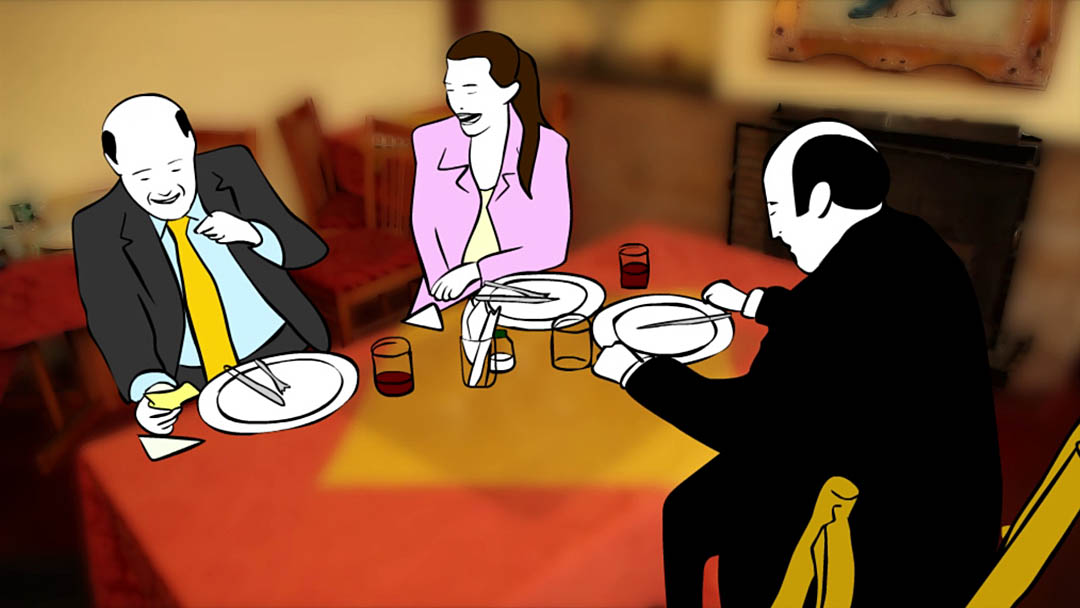
‘About 111 Girls’ opens Bates’ sixth season of award-winning Global Lens films
A showcase of international films selected for authentic voice, strong cinematics and unique cultural perspectives, the 2013 Global Lens series premieres at Bates College with the Iraqi film About 111 Girls at 7:30 p.m. Monday, Sept. 9, in Room 104 of the Olin Arts Center, 75 Russell St.
Global Lens screenings at Bates are open to the public at no cost. The series continues at 7:30 p.m. Mondays in Olin 104 through Nov. 18, skipping Oct. 14.
Global Lens 2013 is presented by the Bates College Museum of Art in cooperation with the Bates College libraries, and with co-sponsorship by the programs in Asian studies and Latin American studies. For more information, please call 207-786-8212 or visit bates.edu/museum.
Directed by Nahid Ghobadi and Bijan Zamanpira, About 111 Girls is the story of an Iranian state official, his driver and a young guide who race across a troubled but magnificent landscape to stop 111 young Kurdish women from committing suicide in protest against conditions that have left them spinsters. Against a dramatic physical and human landscape, wistful longing mingles with dreamlike desire and absurdist humor as the travelers meander helplessly in a land riddled with contradictions. (2012; 79 min.)
2013 is the sixth year the Bates museum has presented Global Lens. “Providing our community, which grows more diverse each year, with films from around the world helps everyone understand the similarities of the human condition and the particular challenges people face in various countries and cultures,” says Anthony Shostak, curator of education for the museum and Bates coordinator of Global Lens.
Organized by the Global Film Initiative, the 2013 Global Lens series comprises 10 narrative features from Brazil, Chile, China, Egypt, India, Iran, Iraq, Kazakhstan, Mexico and Serbia. In addition to these Bates premieres, the museum and the Latin American studies faculty will present a reprise of several Spanish-language films from previous Global Lens series on Oct. 11-13 as part of celebrations surrounding the inauguration of the Latin American studies major at Bates.
“This year, our 10th year, we went back to our roots,” says Susan Weeks Coulter, board chair of the Global Film Initiative. “Bold and unique storytelling by filmmakers unafraid to take risks with their culture and creativity — it’s a beautiful lineup.”
Here’s the remainder of the 2013 Global Lens season at Bates:
- Sept. 16, Beijing Flickers (“Youzhong”). Director Zhang Yuan directs this story of a young man, left behind by Beijing’s fabulous new wealth, who experiences moments of euphoria amid despair as he roams the city with other misfit dreamers in this darkly funny, gorgeously gritty portrait of disaffected youth. (China, 2012, 96 min.)
- Sept. 23, Cairo 678. For his feature debut, writer-director Mohamed Diab depicts three Cairene women from different backgrounds who warily unite to combat the sexual harassment that has impacted each of their lives — and become a citywide plague. But their unconventional response provokes a dogged police hunt. (Egypt, 2010, 100 min.)
- Sept. 30, The Fantastic World of Juan Orol (“El Fantástico Mundo De Juan Orol”). Move over Ed Wood! Director and co-writer Sebastián el Amo’s debut feature pays tribute to Mexico’s half-forgotten B-movie master, the “involuntary surrealist” Juan Orol. A deft, irresistible love letter to life, the movies and a self-made man of showbiz. (Mexico, 2012, 90 min.)
- Oct. 7, Life Kills Me (“La Vida Me Mata”). Life and death come wrapped in a mutual embrace, absurd and poignant at once, in director Sebastián Silva’s film about the unlikely friendship between a grieving young cinematographer and a morbidly obsessed drifter. This debut pulses with a sure cinematic style as it channels a compassionate vision of frail, formidable, unforgettable lives. (Chile, 2007, 92 min.)
- Oct. 21, Modest Reception (“Paziraie Sadeh”). Two sibling sophisticates from Tehran travel the mountainous north, maniacally pushing bags of money on locals — a hilarious and alarming exercise that unfurls with unexpected force amid subtle themes of power and corruption. This comedy-drama is led by riveting performances from Taraneh Alidoosti and co-writer and director Mani Haghighi. (Iran, 2012, 100 min.)
- Oct. 28, The Parade (“Parada”). Writer-director Srdjan Dragojevic tells the story of a macho Serbian crime boss who, in exchange for some wedding planning expertise, recruits a ragtag group of Balkan war buddies to provide protection for a Pride march in this rollicking yet poignant comedy inspired by real events. (Serbia, 2011, 115 min.)
- Nov. 4, Shyamal Uncle Turns Off The Lights. An 80-year-old Kolkata retiree is determined to get the streetlights turned off after sunrise, but finding someone to take him seriously proves a battle against an indifferent bureaucracy and a complacent status quo. Writer-director Suman Ghosh’s vérité-style film is alive with the sights, sounds and personalities of this old neighborhood in this wry, revealing, highly original tour of modern India. (India, 2012, 65 min.)
- Nov. 11, Southwest (“Sudoeste”). In director Eduardo Nunes’ debut, a young woman on her deathbed gives birth to a child who, spirited away to a remote lakeside village, lives her lifetime in a single day in this haunting tale. Precious strands of memory, identity and desire add up to a palpable affirmation of our place in the ineffable stream of life. (Brazil, 2011, 128 min.)
- Nov. 18, Student. A solitary philosophy student commits a calculated violent crime against the backdrop of Kazakhstan’s growing inequality, institutional corruption and a ruthless ethic of eat or be eaten in this broodingly contemporary adaptation of Dostoevsky’s “Crime and Punishment.” Written and directed by Darezhan Omirbayev. (Kazakhstan, 2012, 90 min.)








